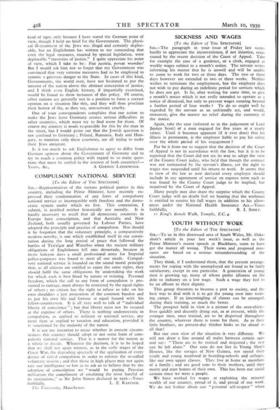COMPULSORY NATIONAL SERVICE
[To the Editor of THE SPECTATOR] SIR,—Representatives of the various political parties in this country, including the Prime Minister, have recently ex- pressed their condemnation of any form of compulsory national service as incompatible with freedom and the demo- cratic system under which we live. This contention, I submit, is justified neither historically nor morally. It is hardly necessary to recall that all democratic countries in Europe have conscription, and that Australia and New Zealand, both usually governed by Labour Parties, have adopted the principle and practice of compulsion. Nor should it be forgotten that the voluntary principle, a comparatively modern novelty, is one which established itself in our consti- tution during the long period of peace that followed the battles of Trafalgar and Waterloo when the ancient military obligations of Englishmen fell into desuetude, because in those halcyon days a small professional army for Imperial police-purposes was found tc meet all our needs. Compul- sory national service is founded on the sound moral principle that, as all citizens are entitled to enjoy the same rights, they should fulfil the same obligations by undertaking the work for which each is best fitted by nature or training. Personal freedom, which the call to any form of compulsion is pre- sumed to outrage, must always be restricted by the equal rights of others ; no citizen has the right to refuse to take on his own shoulders a just proportion of the common burden and to put his own life and fortune at equal hazard with his fellow-countrymen. It is all very well to talk of "individual liberty of conscience " ; but that liberty must not be secured at the expense of others. There is nothing undemocratic in compulsion, as applied to military or national service, any more than as applied to taxation and education, provided it is sanctioned by the majority of the nation.
It is not my intention to argue whether in present circum- stances this country should adopt or not some form of com- pulsory national service. That is a matter for the nation as a whole to decide. Whatever the decision, it is to be hoped that we shall not again witness, as in the early stages of the Great War, the degrading spectacle of the application of every device of veiled compulsion in order to enforce the so-called voluntary system ; and that those in high places may not again rate our intelligence so low as to ask us to believe that by the adoption of conscription we "would be paying Prussian militarism the compliment of emulating the most hateful of its institutions," as Sir John Simon declared in 1916.—Yours
faithfully, L. E. KASTNER. The University, Manchester.










































 Previous page
Previous page